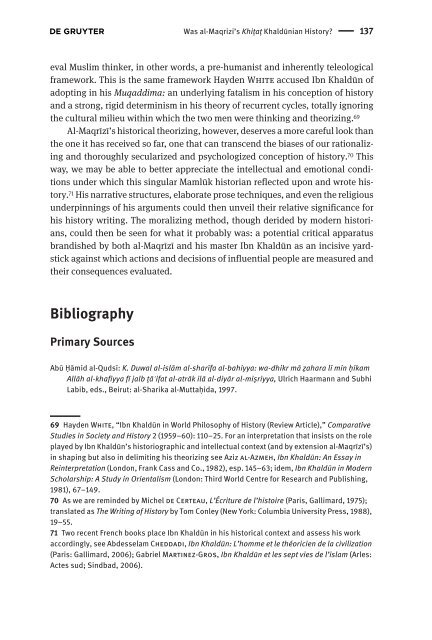0021-1818_islam_98-1-2-i-259
0021-1818_islam_98-1-2-i-259
0021-1818_islam_98-1-2-i-259
You also want an ePaper? Increase the reach of your titles
YUMPU automatically turns print PDFs into web optimized ePapers that Google loves.
Was al-Maqrizi’s Khitat Khaldunian History? 137<br />
eval Muslim thinker, in other words, a pre-humanist and inherently teleological<br />
framework. This is the same framework Hayden White accused Ibn Khaldun of<br />
adopting in his Muqaddima: an underlying fatalism in his conception of history<br />
and a strong, rigid determinism in his theory of recurrent cycles, totally ignoring<br />
the cultural milieu within which the two men were thinking and theorizing. 69<br />
Al-Maqr\z\’s historical theorizing, however, deserves a more careful look than<br />
the one it has received so far, one that can transcend the biases of our rationalizing<br />
and thoroughly secularized and psychologized conception of history. 70 This<br />
way, we may be able to better appreciate the intellectual and emotional conditions<br />
under which this singular Mamluk historian reflected upon and wrote history.<br />
71 His narrative structures, elaborate prose techniques, and even the religious<br />
underpinnings of his arguments could then unveil their relative significance for<br />
his history writing. The moralizing method, though derided by modern historians,<br />
could then be seen for what it probably was: a potential critical apparatus<br />
brandished by both al-Maqr\z\ and his master Ibn Khaldun as an incisive yardstick<br />
against which actions and decisions of influential people are measured and<br />
their consequences evaluated.<br />
Bibliography<br />
Primary Sources<br />
Abu 0amid al-Quds\: K. Duwal al-<strong>islam</strong> al-sharifa al-bahiyya: wa-dhikr ma zahara li min hikam<br />
Allah al-khafiyya fi jalb ta#ifat al-atrak ila al-diyar al-misriyya, Ulrich Haarmann and Subhi<br />
Labib, eds., Beirut: al-Sharika al-Mutta1ida, 1997.<br />
69 Hayden White, “Ibn Khaldun in World Philosophy of History (Review Article),” Comparative<br />
Studies in Society and History 2 (1959–60): 110–25. For an interpretation that insists on the role<br />
played by Ibn Khaldun’s historiographic and intellectual context (and by extension al-Maqr\z\’s)<br />
in shaping but also in delimiting his theorizing see Aziz al-Azmeh, Ibn Khaldun: An Essay in<br />
Reinterpretation (London, Frank Cass and Co., 1<strong>98</strong>2), esp. 145–63; idem, Ibn Khaldun in Modern<br />
Scholarship: A Study in Orientalism (London: Third World Centre for Research and Publishing,<br />
1<strong>98</strong>1), 67–149.<br />
70 As we are reminded by Michel de Certeau, L’Écriture de l’histoire (Paris, Gallimard, 1975);<br />
translated as The Writing of History by Tom Conley (New York: Columbia University Press, 1<strong>98</strong>8),<br />
19–55.<br />
71 Two recent French books place Ibn Khaldun in his historical context and assess his work<br />
accordingly, see Abdesselam Cheddadi, Ibn Khaldun: L’homme et le théoricien de la civilization<br />
(Paris: Gallimard, 2006); Gabriel Martinez-Gros, Ibn Khaldun et les sept vies de l’<strong>islam</strong> (Arles:<br />
Actes sud; Sindbad, 2006).


